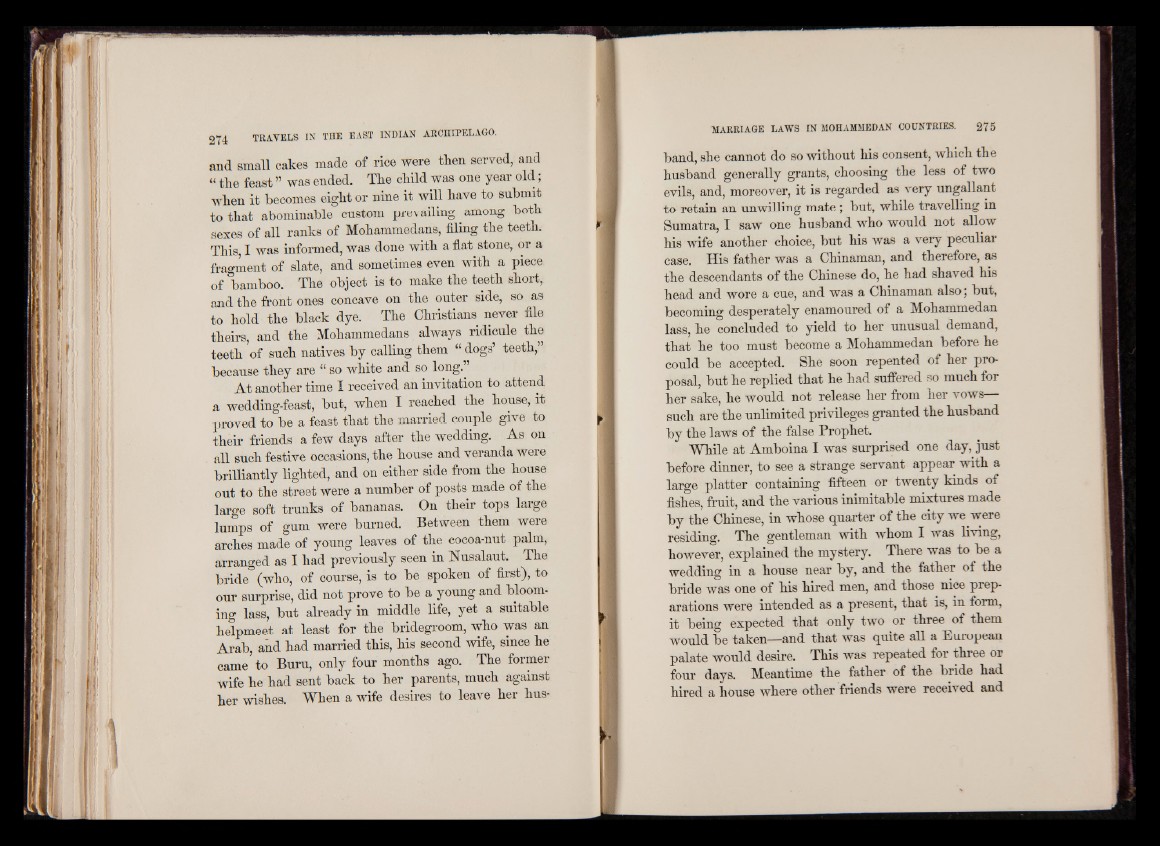
and small cakes made of rice were then served, and
“ the feast ” was ended. The child was one year old;
when it becomes eight or nine it will have to submit
to that abominable custom prevailing ^ among both
sexes of all ranks of Mohammedans, filing the teeth.
This, I was informed, was done with a flat stone, or a
fragment of slate, and sometimes even with a piece
of bamboo. The object is to make the teeth short,
and the front ones concave on the outer side, so as
to hold the black dye. The Christians never file
theirs, and the Mohammedans always ridicule the
teeth of such natives by calling them “ dogs’ teeth,”
because they are “ so white and so long.”
At another time I received an invitation to attend
a wedding-feast, but, when I reached the house, it
proved to be a feast that the married couple give to
their friends a few days after the wedding. As on
all such festive occasions, the house and veranda were
brilliantly lighted, and on either side from the house
out to the street were a number of posts made of the
large soft trunks of bananas. On their tops large
lumps of gum were burned. Between them were
arches made of young leaves of the cocoa-nut palm,
arranged as I had previously seen in Nusalaut. The
bride (who, of course, is to be spoken of first), to
our surprise, did not prove to be a young and blooming
lass, but already in middle life, yet a suitable
helpmeet at least for the bridegroom, who was an
Arab, and had married this, his second wife, since he
came’to Buru, only four months ago. The former
wife he had sent back to her parents, much against
her wishes. When a wife desires to leave her husband,
she cannot do so without his consent, which the
husband generally grants, choosing the less of two
evils, and, moreover, it is regarded as very ungallant
to retain an unwilling mate ; but, while travelling in
Sumatra, I saw one husband who would not allow
his wife another choice, but his was a very peculiar
case. His father was a Chinaman, and therefore, as
the descendants of the Chinese do, he had shaved his
head and wore a cue, and was a Chinaman also; but,
becoming desperately enamoured of a Mohammedan
lass, he concluded to yield to her unusual demand,
that he too must become a Mohammedan before he
could be accepted. She soon repented of her proposal,
but he replied that he had suffered so much for
her sake, he would not release her from her vows—
such are the unlimited privileges granted the husband
by the laws of the false Prophet.
While at Amboina I was surprised one day, just
before dinner, to see a strange servant appear with a
large platter containing fifteen or twenty kinds of
fishes, fruit, and the various inimitable mixtures made
by the Chinese, in whose quarter of the city we were
residing. The gentleman with whom I was living,
however, explained the mystery. There was to be a
wedding in a house near by, and the father of the
bride was one of his hired men, and those nice preparations
were intended as a present, that is, in form,
it being expected that only two or three of them
would be taken—and that was quite all a European
palate would desire. This was repeated for three or
four days. Meantime the father of the bride had
hired a house where other friends were received and